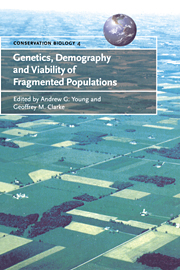Book contents
- Frontmatter
- Contents
- List of contributors
- Foreword by Peter F. Brussard
- Preface
- 1 Introduction: genetics, demography and the conservation of fragmented populations
- Part I Introductory concepts
- 2 Managing and monitoring genetic erosion
- 3 Inbreeding and outbreeding depression in fragmented populations
- 4 Demography and extinction in small populations
- 5 The metapopulation paradigm: a fragmented view of conservation biology
- 6 Population viability analysis for conservation: the good, the bad and the undescribed
- 7 Applications of population genetics and molecular techniques to conservation biology
- Part II Animal case studies
- Part III Plant case studies
- References
- Index
5 - The metapopulation paradigm: a fragmented view of conservation biology
Published online by Cambridge University Press: 29 January 2010
- Frontmatter
- Contents
- List of contributors
- Foreword by Peter F. Brussard
- Preface
- 1 Introduction: genetics, demography and the conservation of fragmented populations
- Part I Introductory concepts
- 2 Managing and monitoring genetic erosion
- 3 Inbreeding and outbreeding depression in fragmented populations
- 4 Demography and extinction in small populations
- 5 The metapopulation paradigm: a fragmented view of conservation biology
- 6 Population viability analysis for conservation: the good, the bad and the undescribed
- 7 Applications of population genetics and molecular techniques to conservation biology
- Part II Animal case studies
- Part III Plant case studies
- References
- Index
Summary
ABSTRACT
In the past, single-population approaches have dominated ecology and evolutionary biology. However, populations are not isolated either in time or space, but are connected by among-population processes such as migration and gene flow. While this concept is not new, until recently, there have been relatively few studies that have explicitly investigated the effects of spatial structure on demographic and genetic processes in the context of conservation. The metapopulation framework explicitly recognises and provides a conceptual tool for dealing with the interactions of within- (e.g. birth, death, competition) and among-population processes (e.g. dispersal, gene flow, colonisation and extinction). The ever-growing diversity of empirical and theoretical studies that demonstrate the importance of spatial structure in determining ecological and evolutionary trajectories also indicates that long-term conservation programmes need to focus on regional rather than local within-population persistence. In this regard, it is important to realise that ultimately all populations are ephemeral, and therefore colonisation processes must also be preserved. Clearly, not all species whose populations have undergone fragmentation fit the definition of a metapopulation. Nevertheless, a metapopulation approach to conservation biology is likely to provide a useful tool for developing management strategies as it addresses genetic, species and community effects of fragmentation in a single framework, thereby making explicit questions regarding extinction, population connectedness, species behavioural patterns and the survival of coevolved systems. In essence, a metapopulation perspective ensures a processoriented, scale-appropriate approach to conservation that focuses attention on among-population processes critical for persistence of many natural systems.
THEMETAPOPULATION PARADIGM: AN INTRODUCTION
Traditionally, ecological studies of natural systems have been dominated by a focus on single populations, or several populations sampled at a single point in time.
- Type
- Chapter
- Information
- Publisher: Cambridge University PressPrint publication year: 2000
- 15
- Cited by

